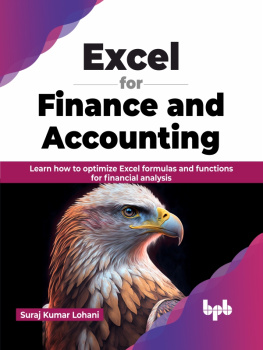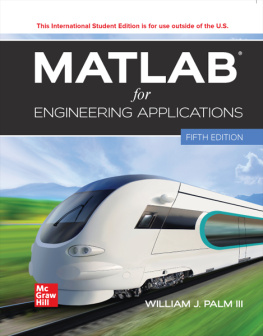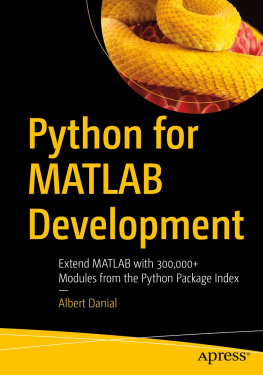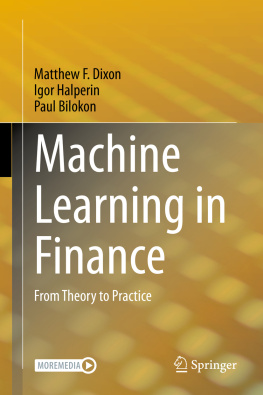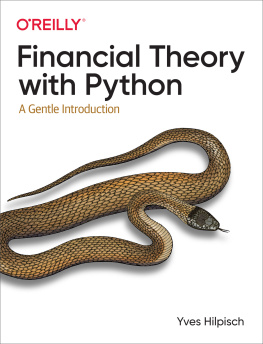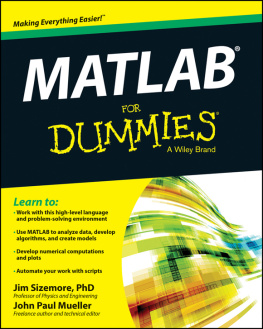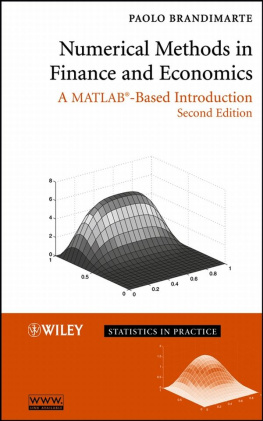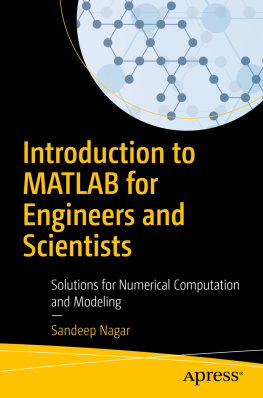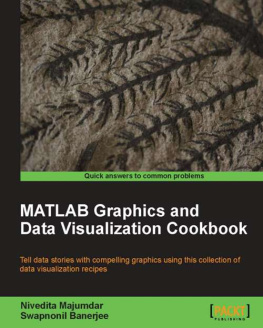Table of Contents
List of Tables
- Chapter 1
- Chapter 2
- Chapter 4
- Chapter 5
- Chapter 6
- Chapter 7
- Chapter 8
- Chapter 9
List of Illustrations
- Chapter 1
- Chapter 2
- Chapter 3
- Chapter 4
- Chapter 6
- Chapter 7
- Chapter 8
- Chapter 9
- Chapter 10
- APPENDIX 1
Guide
Pages
Foundations of Computational Finance with MATLAB
Ed McCarthy
Copyright 2018 by John Wiley & Sons, Inc. All rights reserved.
Published by John Wiley & Sons, Inc., Hoboken, New Jersey.
Published simultaneously in Canada.
No part of this publication may be reproduced, stored in a retrieval system, or transmitted in any form or by any means, electronic, mechanical, photocopying, recording, scanning, or otherwise, except as permitted under Section 107 or 108 of the 1976 United States Copyright Act, without either the prior written permission of the Publisher, or authorization through payment of the appropriate per-copy fee to the Copyright Clearance Center, Inc., 222 Rosewood Drive, Danvers, MA 01923, (978) 7508400, fax (978) 6468600, or on the Web at www.copyright.com. Requests to the Publisher for permission should be addressed to the Permissions Department, John Wiley & Sons, Inc., 111 River Street, Hoboken, NJ 07030, (201) 7486011, fax (201) 7486008, or online at www.wiley.com/go/permissions.
Limit of Liability/Disclaimer of Warranty
MATLAB is a trademark of The MathWorks, Inc. and is used with permission. The MathWorks does not warrant the accuracy of the text or exercises in this book. This work's use or discussion of MATLAB software or related products does not constitute endorsement or sponsorship by The MathWorks of a particular pedagogical approach or particular use of the MATLAB software. While the publisher and authors have used their best efforts in preparing this work, they make no representations or warranties with respect to the accuracy or completeness of the contents of this work and specifically disclaim all warranties, including without limitation any implied warranties of merchantability or fitness for a particular purpose. No warranty may be created or extended by sales representatives, written sales materials or promotional statements for this work. The fact that an organization, website, or product is referred to in this work as a citation and/or potential source of further information does not mean that the publisher and authors endorse the information or services the organization, website, or product may provide or recommendations it may make. This work is sold with the understanding that the publisher is not engaged in rendering professional services. The advice and strategies contained herein may not be suitable for your situation. You should consult with a specialist where appropriate. Further, readers should be aware that websites listed in this work may have changed or disappeared between when this work was written and when it is read. Neither the publisher nor authors shall be liable for any loss of profit or any other commercial damages, including but not limited to special, incidental, consequential, or other damages.
For general information on our other products and services or for technical support, please contact our Customer Care Department within the United States at (800) 7622974, outside the United States at (317) 5723993, or fax (317) 5724002.
Wiley publishes in a variety of print and electronic formats and by print-on-demand. Some material included with standard print versions of this book may not be included in e-books or in print-on-demand. If this book refers to media such as a CD or DVD that is not included in the version you purchased, you may download this material at http://booksupport.wiley.com. For more information about Wiley products, visit www.wiley.com.
Library of Congress Cataloging-in-Publication Data
Names: McCarthy, Ed (Edward), 1955 author.
Title: Foundations of computational finance with MATLAB / by Ed McCarthy.
Description: Hoboken, New Jersey : John Wiley & Sons, Inc., [2018] | Includes index. |
Identifiers: LCCN 2018014808 (print) | LCCN 2018016054 (ebook) | ISBN 9781119433873 (epub) | ISBN 9781119433910 (pdf) | ISBN 9781119433859 (cloth)
Subjects: LCSH: FinanceMathematical models. | FinanceData processing.
Classification: LCC HG106 (ebook) | LCC HG106 .M396 2018 (print) | DDC 332.0285/53dc23
LC record available at https://lccn.loc.gov/2018014808
Cover Design: Wiley
Cover Image: monsitj/iStockphoto
To my wife, Diane
Introduction
Why You Should Read This Book
If you're planning a career in corporate or investment finance or already working in one of those areas, you're probably proficient with financial calculators and spreadsheets. Those technologies have proven their value, and it's likely they will remain essential tools for many years. (I still use a 30-year-old Hewlett Packard 12C calculator regularly and it works perfectly, albeit a bit slower than newer models.)
But the nature of data and analytics are changing, and those changes are influencing financial analysis and management. Traditional financial data still drive decisions, but those data are being supplemented by increasing volumes of nontraditional information and new computational tools. Consider these headlines from recent years, which are just a small sample of the articles on these themes:
- Stop Using Excel, Finance Chiefs Tell Staffs (Wall Street Journal, 1/22/1017)
- The Quants Run Wall Street Now (Wall Street Journal, article series in May 2017)
- At New Digital Lenders, Math Rules (New York Times, 1/19/2016)
- Leveraging Data to Own the Engaged Customer (Utility Analytics, 11/4/2015)
- The Morning Ledger: The Rising Profile of Financial Planning and Analysis (Wall Street Journal, 12/22/2015)
- How Computers Trawl a Sea of Data for Stock Picks (Wall Street Journal, 4/1/2015)
- As Big Data and AI Take Hold, What Will It Take to Be an Effective Executive? (Wall Street Journal, 1/23/2015)
I believe this paradigm shift requires a new approach to financial analysis and management. Specifically, finance professionals must supplement their calculators and spreadsheets with more flexible and powerful computational platforms. These platforms can work with the new data models while still providing the tools needed for traditional financial analysis. As the headlines suggest, remaining competitive in financial analysis and management will require an understanding of and skill with computational finance. This knowledge will allow you to access data from multiple sources, develop customized financial analytics, and then distribute your tools and findings across a variety of platforms.
The Intended Reader
Transitioning to the new paradigm is a challenge, though, because it means learning about computational finance. Other authors have addressed this topic, but they focused on advanced material for readers who combine extensive math, statistics, programming, and finance backgrounds, such as financial engineers and academics.
In contrast, I wrote this book for readers seeking an introductory text that links traditional finance material to the MATLAB computational platform. This includes upper-level undergraduate finance students, graduate students, finance practitioners, and those with STEM backgrounds seeking to learn about finance. My assumption is that your background will be: (1) A business student or finance professional who is comfortable with finance theory but has modest computer programming experience beyond spreadsheets, or (2) A STEM student or professional who has a more extensive programming background but less experience with finance.








